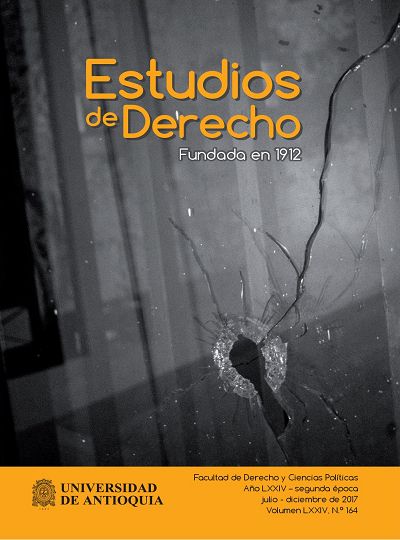Critical pedagogy and restorative justice: a virtuous relationship for citizenship formation
DOI:
https://doi.org/10.17533/udea.esde.v74n164a09Keywords:
restorative justice, critical pedagogy, citizen education, coexistence, alternative conflict resolution mechanismsAbstract
At present, from a variety of academic, legal perspectives and pedagogical experiences in situ, there is a great deal of effort towards the promotion of the school as a political agent from which to think and contribute to the establishment of a culture of peace. Thus, alternative mechanisms of conflict resolution (AMCR) and specifically the approach of Restorative Justice has appeared with a leading role from which to materialize this goal. In this way, the present article analyzes the points of encounter between this new approach of coexistence and the critical pedagogy with a view to providing theoretical contributions that allow legitimizing the adoption and the establishment of what some have denominated, restorative culture in the school, as a range of possibilities for citizenship training.
Downloads
References
Arístegui, R; Bazán, D; Leiva, J; López, R; Muñoz, B. & Ruz, J. (2005). Hacia una Pedagogía de la Convivencia. En: Psique, vol. 14, núm. 1, pp. 137-150 Pontificia Universidad Católica de Chile Santiago, Chile.
Bárcena, F. (2005). La experiencia reflexiva en educación. Barcelona: Papeles de Pedagogía, Paidós.
Bocanegra, L. & Tovar, R. (2008): Resolución de conflictos en la escuela a partir de los principios de la justicia restaurativa. Tesis concluida Psicología. Universidad Santo Tomás Bogotá.
Builes, L. F., Puerta, I., & Sepúlveda, M. (2015). Convivir pazcíficamente, oportunidades que ofrece la ley 1620. Medellín: Universidad de Antioquia.
Cortina, A. (2001). Ética aplicada y democracia radical. Madrid: Tecnos.
Freire, P. (1994). Cartas a quien pretende enseñar, México, Siglo XXI Editores.
García, J; Ossa, A; & Duarte, F. (2010). Educar: Combatir el miedo estructural de la sociedad actual. En: Uni-pluri/versidad, Vol. 10, N° 1, pp. 97-108. Medellín: Facultad de Educación de la Universidad de Antioquia.
Gutiérrez, C. & Otros. (2011). Resolución de conflictos en la escuela a partir de los principios de la justicia restaurativa. En: Hallazgos Revista de investigaciones, Nº 16, Vol. 08, Julio-Diciembre.
Herrera, M., Pinilla, A., Díaz, C., & Infante, R. (2005). La construcción de cultura política en Colombia: proyectos hegemónicos y resistencias culturales. (L. E. Vázquez Salamanca, Ed.) (Primero). Bogotá, D.C.: Domardhi Ltda.
Hurtado, D. & Álvarez, D. (2006). La formación de ciudadanías en contextos conflictivos Estudios Políticos, núm. 29, julio-diciembre, pp. 80-96.
Larrauri, E. (2004). Tendencias actuales de la Justicia restauradora. Estudios de Derecho.
V. 61, Núm 163, pp. 55-58.
Ortega, P. (2009). La Pedagogía Crítica: Reflexiones en torno a sus prácticas y sus desafíos. En: Pedagogía y Saberes. Núm.31.
Pimienta, A. (2008). Formación de ciudadanía en Colombia, Hacia una necesaria repolitización. Uni-pluri/versidad, 8, 1-10.
Portacio, C. (2015). La Justicia Restaurativa como modelo posibilitador del fortalecimiento de la convivencia, la formación de ciudadanía y la construcción de democracia en la escuela. Programa de Derecho, de la Facultad de Derecho y Ciencias Políticas de la Universidad de Antioquia.
Puerta, I. (2010). Justicia escolar. En: Memorias Seminario Educación y Cultura Política, Universidad de Antioquia, Facultad de Educación. Medellín, litoimpresos y servicios Ltda.
Quiroz, R. & Mesa, A. (2011). Currículo crítico en la formación ciudadana. En: Educere, vol. 15, núm. 52, septiembre-diciembre, pp. 621-628 Universidad de los Andes Mérida, Venezuela.
Ramírez, R. (2008). La pedagogía crítica. Una manera ética de generar procesos educativos. En: Revista Folios, Núm. 28, julio-diciembre, pp. 108-119 Universidad Pedagógica Nacional Bogotá, Colombia.
Rodríguez, M. (1997). Hacia una didáctica crítica. Editorial La Muralla, Madrid.
Corte Constitucional de Colombia, Sentencia T-478 (2015)
Skliar, C. & Larrosa, J. (2009). Experiencia y alteridad en educación. Santa Fe: Homo Sapiens Ediciones.
Van Dun, F. (2001). The lawful and the legal. En F. Van Dun. Philosophy of law (pp. 23-45). Amsterdam: University Note Class.
Varnham, S. (2005) Ver las cosas de manera diferente: la justicia restaurativa y la disciplina escolar. En: Educación y la Ley, vol. 17, No. 3, septiembre, pp. 87-104
Wachtel, T. (2013). Definiendo Qué es Restaurativo. Instituto Internacional de Prácticas Restaurativas. Estados Unidos.
Zehr, H. (2007). El pequeño libro de la justicia restaurativa. Good Books. United States of America.
Published
How to Cite
Issue
Section
License
Estudios de Derecho is governed by the following regulation: Political Constitution of Colombia, article 61; Law 23 of 1982, articles 1 and 2; Law 44 of 1993, chapter II, article 6 and chapter IV, article 51; Law 599 of 2000 through which the Penal Code is issued, articles 270, 271 and 272. In addition, the journal is governed by the guidelines of the National Copyright Directorate and the World Intellectual Property Organization (WIPO) for Colombia. Finally, it abides by Rectoral Resolution 21231 of 5 August, 2005, through which the Statute on Intellectual Property is issued.
Authors who publish in Estudios de Derecho continue to retain their rights, however, they should bear in mind that the contents of the journal are under a Creative Commons Attribution-Noncommercial-ShareAlike license. In this sense, The material created may be distributed, copied and exhibited by third parties if they credit it. No commercial benefit can be obtained.










